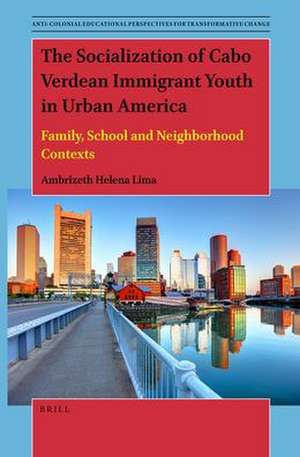The Socialization of Cabo Verdean Immigrant Youth in Urban America: Family, School and Neighborhood Contexts: Anti-colonial Educational Perspectives for Transformative Change, cartea 12
Autor Ambrizeth Helena Limaen Limba Engleză Paperback – 11 mai 2022
Preț: 310.97 lei
Nou
Puncte Express: 466
Preț estimativ în valută:
59.52€ • 64.68$ • 50.03£
59.52€ • 64.68$ • 50.03£
Carte indisponibilă temporar
Doresc să fiu notificat când acest titlu va fi disponibil:
Se trimite...
Preluare comenzi: 021 569.72.76
Specificații
ISBN-13: 9789004466593
ISBN-10: 9004466592
Dimensiuni: 155 x 235 mm
Greutate: 0.2 kg
Editura: Brill
Colecția Brill
Seria Anti-colonial Educational Perspectives for Transformative Change
ISBN-10: 9004466592
Dimensiuni: 155 x 235 mm
Greutate: 0.2 kg
Editura: Brill
Colecția Brill
Seria Anti-colonial Educational Perspectives for Transformative Change
Notă biografică
Ambrizeth Helena Lima, Ed.D., has firsthand experience on the socialization of Cabo Verdean youth in the U.S., since she herself immigrated to the U.S. at 15 years old. After completing her dual bachelor's degree from UMass Dartmouth in English and Portuguese, she completed her doctorate at Harvard Graduate School of Education. She has authored many book chapters and has presented nationally and internationally.
Cuprins
Preface
Acknowledgments
Introduction
1 What Are You? The Case of Cabo Verdeans
1 Ethnohistorical Frameworks and Theoretical Lenses
1 The Arrival of the European Navigators to the Cabo Verde Islands
2 The Definition of Race and Ethnicity in Cabo Verde
3 The Dichotomous Nature of Race in the United States
4 The “Stepwise” Pattern of Cabo Verdean Immigration to the United States
5 The Racialization Process of Black-Identified Immigrant Youth in the United States
6 The Theoretical Lenses
7 The Social Context: Family, School, and Neighborhood
8 Summary
2 Broken Families, Broken Hearts: Family Separation and Reunification
3 Who Showed You Such a Distant Road? Linguistic and Cultural Dynamics within the Home, School, and Neighborhood Contexts
1 The Many Definitions of “A Better Life”
2 Linguistic and Cultural Dynamics within the Family Context
3 Linguistic and Cultural Dynamics within the School Context
4 Linguistic and Cultural Dynamics within the Neighborhood Context
5 Summary
4 Race, Gender, and Ethnicity
1 The Family Context
2 Identities in Context: “I’m a True Citizen of Cabo Verde”
3 Race and Ethnicity within the School Context: The Role of School Personnel as Agents of Socialization
4 The Community Context: Friendship Networks
5 Summary
5 Where Past and Present Intersect: Planning the Future
1 “You’re on Your Own”: From Rural Cabo Verde to Urban America
2 Racial and Ethnic Profiling
3 “Urban Insulation”: Sticking with Their Own
4 “I Didn’t Use to Like Cheeseburgers, But Now I Do!”
5 Becoming American: Is It Possible?
6 The Significance of Leaders
7 Dreams and Aspirations of a Generation
8 Summary
6 Conclusion
1 The Family Context
2 The School Context
3 The Neighborhood Context
4 Recommendations
5 Looking for Life
References
Index
Acknowledgments
Introduction
1 What Are You? The Case of Cabo Verdeans
1 Ethnohistorical Frameworks and Theoretical Lenses
1 The Arrival of the European Navigators to the Cabo Verde Islands
2 The Definition of Race and Ethnicity in Cabo Verde
3 The Dichotomous Nature of Race in the United States
4 The “Stepwise” Pattern of Cabo Verdean Immigration to the United States
5 The Racialization Process of Black-Identified Immigrant Youth in the United States
6 The Theoretical Lenses
7 The Social Context: Family, School, and Neighborhood
8 Summary
2 Broken Families, Broken Hearts: Family Separation and Reunification
3 Who Showed You Such a Distant Road? Linguistic and Cultural Dynamics within the Home, School, and Neighborhood Contexts
1 The Many Definitions of “A Better Life”
2 Linguistic and Cultural Dynamics within the Family Context
3 Linguistic and Cultural Dynamics within the School Context
4 Linguistic and Cultural Dynamics within the Neighborhood Context
5 Summary
4 Race, Gender, and Ethnicity
1 The Family Context
2 Identities in Context: “I’m a True Citizen of Cabo Verde”
3 Race and Ethnicity within the School Context: The Role of School Personnel as Agents of Socialization
4 The Community Context: Friendship Networks
5 Summary
5 Where Past and Present Intersect: Planning the Future
1 “You’re on Your Own”: From Rural Cabo Verde to Urban America
2 Racial and Ethnic Profiling
3 “Urban Insulation”: Sticking with Their Own
4 “I Didn’t Use to Like Cheeseburgers, But Now I Do!”
5 Becoming American: Is It Possible?
6 The Significance of Leaders
7 Dreams and Aspirations of a Generation
8 Summary
6 Conclusion
1 The Family Context
2 The School Context
3 The Neighborhood Context
4 Recommendations
5 Looking for Life
References
Index












